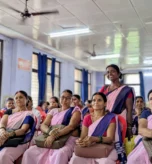“Success is not final; failure is not fatal: it is the courage to continue that counts.” – Winston S. Churchill
Madhavi, a 22-year-old young woman working in rural Bihar, was struck by a life-altering personal tragedy just one month into her Gandhi Fellowship. Her father passed away, leaving her emotionally devastated and questioning whether she could continue her work. At the same time, the Primary Health Centre (PHC) she was working at was grappling with significant challenges: high Maternal Mortality Rates (MMR) and low morale among the ASHA workers.
Balancing personal grief with the intense responsibilities of her fellowship tested Madhavi’s resilience in unimaginable ways. But rather than succumbing to her pain, she found the strength to keep going, ultimately turning her grief into a driving force for meaningful change. In doing so, she not only transformed herself but also had a profound impact on the community she served.
Madhavi’s story is a compelling reminder of the power of resilience—how adversity can be a catalyst for personal growth and how, when nurtured, resilience can ignite social change.
At Piramal Foundation, we have witnessed many such stories of young individuals, like Madhavi, who have demonstrated the transformative power of resilience. After 15 years of working with young leaders through the Gandhi Fellowship Program, I’ve come to see resilience as not just a skill but a mindset—a mindset that empowers young people to overcome life’s toughest challenges and lead with courage and conviction.
Resilience in Action: The Turning Point for Madhavi
Madhavi’s story is not unique, but it is emblematic of the struggles many young people face today. Whether dealing with personal loss, professional pressure, or systemic issues, today’s youth are often confronted with adversity. What sets individuals like Madhavi apart is their ability to face these challenges with resilience—a trait that is increasingly vital in our fast-changing world. From global pandemics to economic uncertainty, resilience has become a non-negotiable trait for navigating today’s complexities.
Madhavi’s ability to turn her grief into a force for good illustrates the importance of perseverance, emotional strength, and the willingness to keep moving forward despite overwhelming odds. This speaks to one of the core principles of the Gandhi Fellowship: how do we help young people build the mental toughness that allows them to persist, adapt, and grow, even in the face of adversity?
Resilience as a Core Competency in Leadership
For Madhavi and many other Gandhi Fellows, resilience has become a core part of their identity—a skill that shapes how they approach challenges, solve problems, and inspire others. Resilience is no longer just a response to hardship; it is a mindset that empowers individuals to,
- Empower themselves by taking ownership of their circumstances.
- Overcome obstacles that might otherwise derail their progress.
- Thrive despite setbacks, emerging stronger and more capable.
Gandhi Fellows often find themselves in high-pressure situations, dealing with complex social issues, volatile stakeholders, and constantly changing policies. In these environments, resilience becomes their anchor, allowing them to stay grounded, optimistic, and focused on their long-term goals. Structured debriefs, reflective dialogues, and mentoring play a critical role in helping Fellows build this resilience, offering them the support and space to process their experiences and learn from them.
Resilience in Change Management: How Madhavi Transformed Her Challenges
At Piramal Foundation, one of the key areas we focus on is change management—the ability to navigate the turbulence that inevitably comes with change. While change can be overwhelming, it is also an opportunity for growth. The challenge, however, lies in preparing, supporting, and empowering individuals to manage change effectively so that they can emerge stronger on the other side.
Madhavi’s story is a perfect example of how resilience can turn a personal crisis into a catalyst for social change. Faced with the unimaginable loss of her father, she had two choices:
- Succumb to her grief, allowing it to rob her of her sense of purpose and drive.
- Harness her grief, using it as a source of strength to create something meaningful and impactful.
She chose the latter, demonstrating a range of behaviors that would ultimately lead to profound success for her and her community:
- Adaptability: Madhavi was able to adjust to life without her father, learning to cope with new circumstances and embracing new ways of working, including seeking mentorship and guidance.
- Emotional Strength: She displayed remarkable emotional resilience, managing her grief while maintaining a positive outlook and staying focused on her goals.
- Problem-solving and Flexibility: Madhavi found creative solutions to challenges, such as using her grief to fuel counseling sessions for pregnant women and mothers, helping them process their own struggles.
- Support Systems: She built a strong network of support with her peers, ASHA workers, and mentors, creating a culture of mutual encouragement and shared growth.
- Long-term Focus: Despite her personal loss, Madhavi kept her focus on her long-term goal—reducing the Maternal Mortality Rate at the PHC—rather than allowing temporary setbacks to overwhelm her.
Thanks to Madhavi’s ability to harness her resilience, we now have a clearer understanding of how resilience functions in the context of change management. It is about creating an environment where people and teams can face inevitable challenges head-on, with the determination and confidence needed to keep moving forward.



